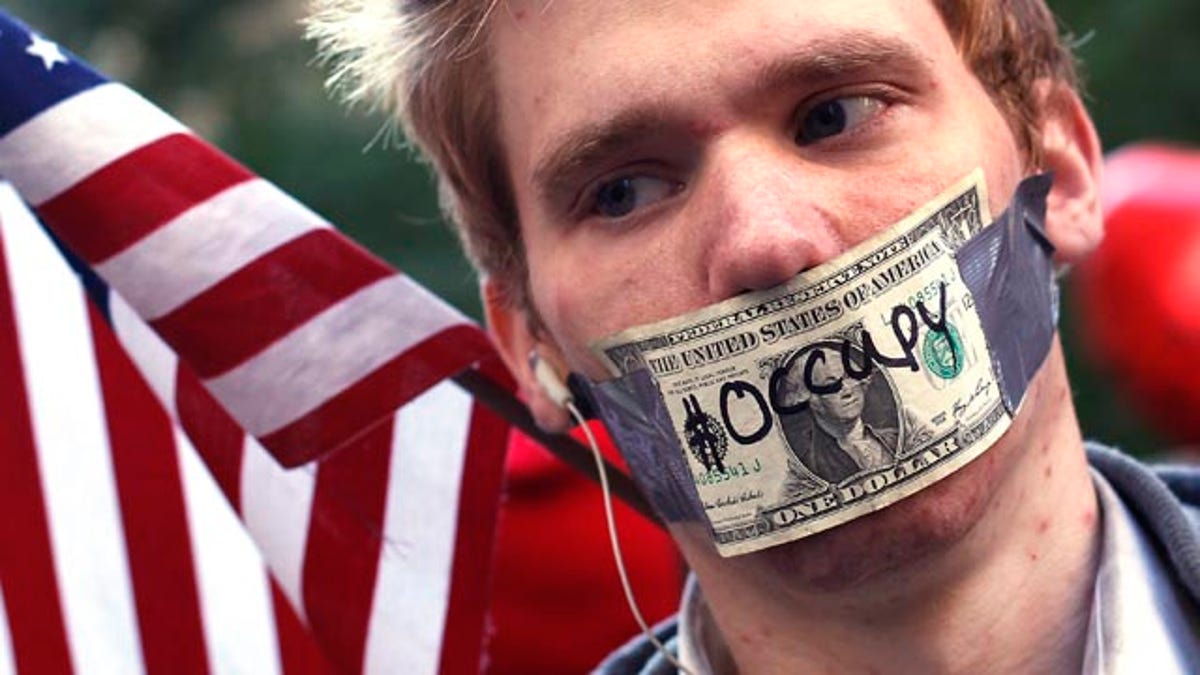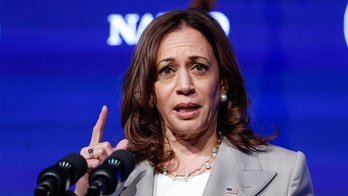
Oct. 17, 2011: An Occupy Wall Street campaign demonstrator stands in Zuccotti Park, near Wall Street in New York. (Reuters)
As Occupy Wall Street protesters and their anti-bank message pick up momentum, among the unofficial list of grievances is a demand to have creditors forgive student loans.
But a new survey suggests Americans are split on the idea, and education analysts say it would duplicate the same bad behavior the protesters are decrying.
Picking up the protesters' thread, liberal interest group MoveOn.org is pushing a national petition that at last count had 600,000 signatures for the forgiveness of "all" student loan debt in America.
The petition, drafted by attorney and MoveOn member Robert Applebaum, claims debt forgiveness would have an "immediate stimulative effect" on the economy as "millions of Americans" would have more pocket cash.
"As consumer spending increases, businesses will begin to hire, jobs will be created and a new era of innovation, entrepreneurship and prosperity will be ushered in for all. A rising tide does, in fact, lift all boats," the petition says.
MoveOn.org forwarded the petition around to supporters in a bid to attract signatures, saying it would do more to stimulate the economy than tax cuts for the wealthy.
But education policy analyst Neal McClusky questions whether supporters of debt forgiveness realize its impact on other Americans.
Though the petition may be aimed at the financial sector, McCluskey, associate director of Cato Institute's Center for Educational Freedom, said the people who would be most hurt by a student loan amnesty would be taxpayers, considering most student loans are either direct federal loans or federally backed private loans.
"The people ultimately on the hook for federal student loans are federal taxpayers," he said. "That would increase the debt and that would put taxpayers even more on the hook for even more debt.
Forgiving student loans would also effectively repeat the financial-sector bailouts of 2008 and 2009, one of the issues the protesters are decrying, McCluskey added.
"We shouldn't do the same thing ... with student loans," he said.
With total student loan debt in America approaching $1 trillion, a new poll shows 38.2 percent of Americans somewhat or strongly agree with the loan forgiveness call. But another 41 percent of adults responding to the American Pulse Survey say they somewhat or completely disagree that college loans should be forgiven. That split is wider among coveted independent voters polled.
Another 21 percent of the 6,043 adults polled between Oct. 10-12 said they couldn't agree or disagree with the idea. The poll had a margin of error of 1.3 percentage points.
Others caution that such a drastic move is not needed, considering the payment options available to indebted ex-students.
Lauren Asher, president of the Institute for College Access & Success, said blanket forgiveness is not the answer, since a number of programs are designed to help struggling ex-students with their loan debt. The challenge is making sure people in financial trouble are aware of those options.
"If you have student loan debt, you already have a lot of ways to manage that debt," she said, adding that it "need not be a financial death sentence."
One option, called public service loan forgiveness, can in some cases forgive debt after a decade of employment in the public sector. Another option, income-based repayment, can cap payments for those who are financially struggling and even cancel payment after 25 years under certain conditions.
Still, the latest petition and the cries from the Occupy Wall Street protests reflect frustration with the growth of debt in recent years. According to The Project on Student Debt, average debt for graduating seniors rose to more than $23,000 in 2008 -- a 24 percent increase from 2004. The total student loan debt in America surpassed the total credit card debt last year.




